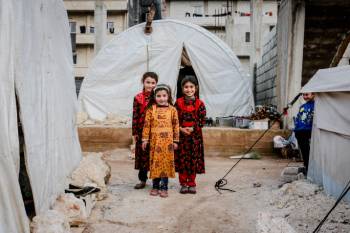The WoS Contribution to SDGs
The Whole of Syria Education (WoS) adopted the United Nations (UN) sustainable development goals as a complementary scope. The primary focus of WoS is ensuring quality education. Alongside the principal goal, the organization also strives for:
- no poverty;
- good health and well-being;
- reduced inequalities;
- responsible consumption and production;
- partnerships for the goals.
 Access to quality education remains the main goal for the WoS international community. The partnership with UNICEF and global partners created an economic framework to support education. The organization is open to proposals to support the education system in Syria. By promoting quality education in developed countries, worldwide organizations tripled the estimated impact. Secondary goals ensured that society is more prepared to face its daily challenges. Although it takes time and effort, a child receiving help early on doubles their chances to get a degree. Children from affected areas achieve better academic results with consistent support.
Access to quality education remains the main goal for the WoS international community. The partnership with UNICEF and global partners created an economic framework to support education. The organization is open to proposals to support the education system in Syria. By promoting quality education in developed countries, worldwide organizations tripled the estimated impact. Secondary goals ensured that society is more prepared to face its daily challenges. Although it takes time and effort, a child receiving help early on doubles their chances to get a degree. Children from affected areas achieve better academic results with consistent support.
WoS contributed to diminishing gender bias in Syria through quality and inclusive education. Girls are more likely to skip school and work around the house. As a result, women don't go to university and don't have jobs, thus facing more financial and social risks. The inclusive education program contributed to integrating more than 3,000 children into the school system. There is still a long way to go. Over 2 million children are still out of school in Syria, and another million are at risk of dropping out.
Besides the direct impact on education, WoS promotes recycling through all its programs. Conference materials are distributed in digital format. Thanks to the organizations supportive of environmental sustainability, all learning materials are digital. Besides being an environmentally-friendly solution, using computers instead of books is more cost-efficient long-term. Remote education is also possible via the Syria Self-Learning Material.
WoS is promoting environmental education and awareness. Pamphlets detailing strategies for green solutions accompanied every event from 2017 onward. The information reached an average of 30,000 people within one year. The primary beneficiaries included partners, schools, and conference attendees. Other than sharing educational resources, WoS implemented two major recycling programs. In areas with a weak economy, locals are not very welcoming of recycling initiatives. In Syria, civil society proved to be receptive. UN experts in engineering held field demonstrations on achieving sustainable energy through recycling.
One step at a time, WoS invests in education to foster progress and avert a dramatic crisis. Aligned with the UN goals of sustainable development, WoS contributes to eradicating hunger through school lunches. In an area where 4 out of 8 children live below the poverty line, a hot meal is another reason to attend school. Due to global support and constant effort, WoS invests in the prosperity of younger generations in Syria.
